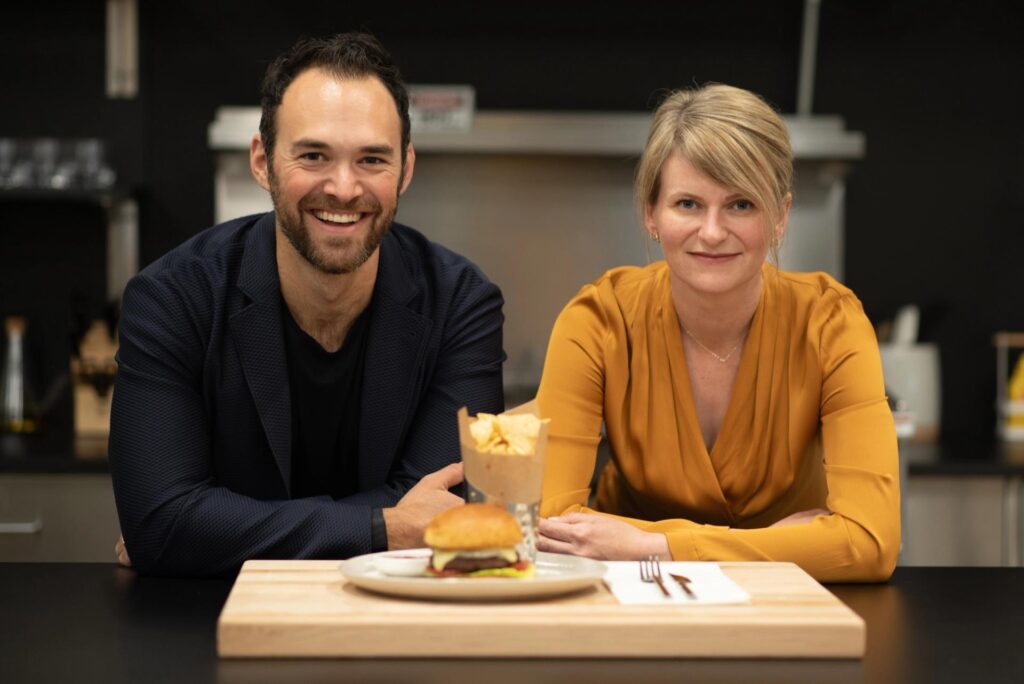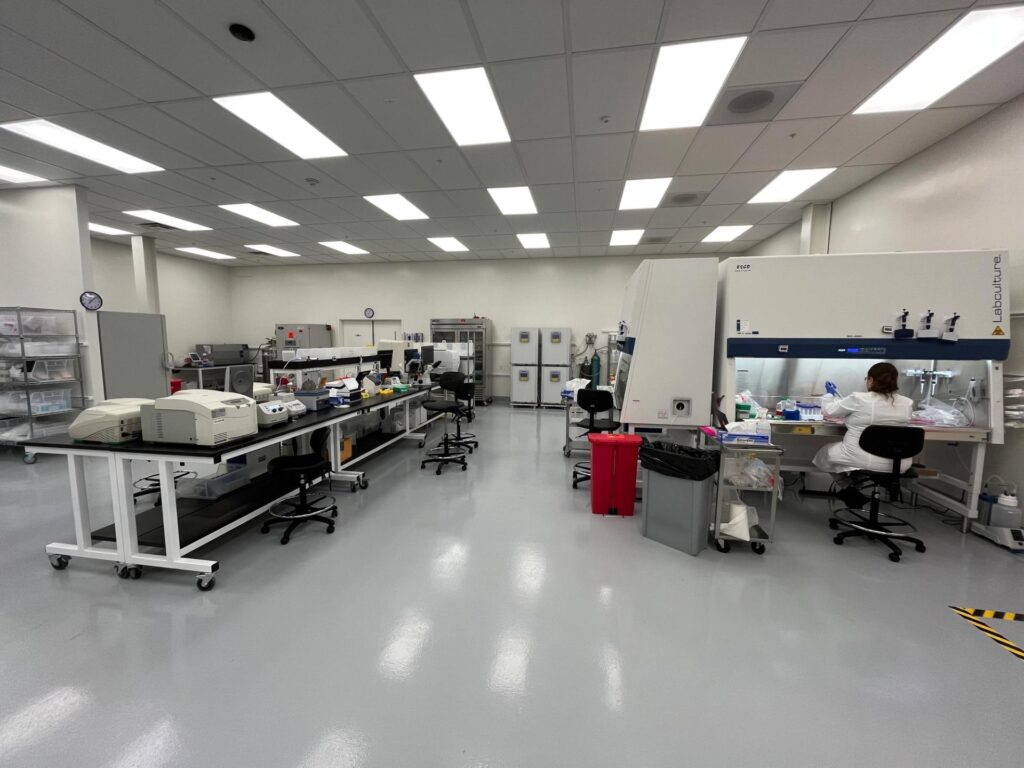SciFi Foods CEO on Cultivated-Plant Hybrid Meat: ‘Buying Food is a Very Emotional Decision’
8 Mins Read
CEO and co-founder of Californian hybrid meat company SciFi Foods Joshua March on alt meat price parity, why he’s all in on combining plant proteins with cultivated meat instead of conventional, and consumers’ disregard for industry terms.
This article is part of our content series exploring the world of hybrid and blended meat products – those blending cultivated or conventional proteins with plant-based ingredients, respectively, and why some think this is the future of reducing meat consumption.
“SCiFi Foods is not the future we fear. It’s the future we dream of.”
That’s the message on the homepage of SciFi Foods, an alt-protein company from California. The future it’s referring to is cultivated meat, but just not in the way you’ve imagined it. SciFi Foods is taking the best of two worlds – the superior taste credentials of cultured proteins and the cost-effectiveness and scalability of plant-based ingredients – to create a hybrid beef product.
There are many reasons for this. First, while Americans may have a bad rep when it comes to meat-eating, plant-based consumption, and linking meat and dairy intake to climate change, a 1,022-person survey by the International Food Information Council (IFIC) this May found that the climate impact of meat and poultry affects the purchasing decisions of 62% of US citizens – for seafood, that number is 45%.
Secondly, Americans have some concerns about the way meat is produced in the country. According to a 1,018-person poll last December by the Good Food Institute (GFI), 46% of Americans are worried about the use of antibiotics. Over a third (36%) are perturbed by the oligopolistic nature of the US meat industry that is dominated by a few very large, and very powerful, corporations, and by the treatment of animals (35%).
Third, there’s a reason why only two companies are authorised to sell cultivated meat in the US. It’s still a relatively nascent category with a tall ladder to climb, not least in terms of regulatory hurdles, production costs and scalability. This problem is exacerbated when you realise that, as per the GFI survey, 46% of Americans are concerned about the rising costs of meat as well.
Reuters claims that cultivated meat needs to reach production costs of $2.92 per pound to be price-competitive with traditional meat. Neither Upside Foods nor Eat JUST, the only two producers with US regulatory approval, have disclosed the absolute per pound costs of their respective cultivated chicken. While cultured meat companies have managed to cut manufacturing costs by 99% in less than a decade, McKinsey analysis estimates that it will still take until 2030 for it to reach price parity with its conventional counterparts, which feels like a long time away.
Despite all that, 45% of respondents in GFI’s survey said they’d likely try cultivated meat. Crucially, this was after the technology was properly described to them. You can look at that as a glass half-empty or half-full manner: nearly half of Americans are receptive to cultured meat, but more than half are not.

The problem with blended meat
All this leaves cultivated meat in limbo. Some companies – like 50/50 Foods and Mush Foods – are betting on blended meat, which differs from hybrid in that it pairs plant proteins with conventional meat. It’s a way people can “have their meat and eat it too”, as 50/50 Foods CEO Andrew Arentowicz told Green Queen last month.
But that category has had its ups and downs, with meat giants like Tyson Foods and retailers like Aldi introducing and subsequently pulling blended meat products from the market. The IFIC survey revealed that while 14% of Americans were eating more blended meats in the last year, that is a decline from the growth seen the year before. Plus, a higher number (20%) are eating fewer of these products, while an equal number have never consumed it.
Plant-based meat has reached mainstream recognition and cultivated meat is making headlines with its regulatory approvals, crowding out the category before you even consider fermentation-based proteins. GFI notes that blended may need support in establishing a value proposition with consumers and needs to reach a broader meat-eating audience to access its full potential.
Allaying consumer concerns

Which brings us back to the future according to SciFi Foods. “We know that 100% cultivated meat may take decades to develop, while hybrid products are possible today,” says its co-founder and CEO Joshua March. “Products that blend plant-based meat with conventional meat are great in concept,” he adds, “but buying food is a very emotional decision.”
This is because “a significant part of the benefit of eating meat alternatives comes from the emotional satisfaction of knowing that no animal was killed”, alongside the climate factor – it’s no secret that plant-based alternatives are much more climate-friendly than meat. “That emotional impact is just not there if ‘slightly fewer animals died for this burger’,” outlines March. “This isn’t about marketing messages, but rather the emotional impact of different products, which make a huge impact.”
But look at the flipside then. Why would meat-eaters who are indifferent to plant-based alternatives and apprehensive of cultivated proteins want to replace their meat with a mix of these two? “We think getting on the market ASAP with an amazing product is the best way to attract all consumers, and our brand is about a tasty burger that uses cultivated beef cells as their magic ingredient,” explains March. “We think the novelty of the cells will attract early consumers, including meat-eaters, and the taste will keep them coming back.”
He continues: “Ultimately, concepts like hybrid or blended are more industry terms and have little relevance for the average consumer.” He punctuates this point with the example of fellow Californian alt-meat company Impossible Foods. “Today, consumers routinely buy the Impossible Burger without dissecting its composition, which includes recombinant proteins produced through precision fermentation [the company’s signature heme ingredient] blended with isolated plant proteins and other ingredients.”
Price parity and 2024 launch plans

Previously called Artemys Foods, SciFi Foods emerged from stealth last year with a $22M Series A round led by blue chip Silicon Valley VC Andreessen Horowitz (a16z), moving into a new 16,000 sq ft pilot facility. Even with hybrid products, March says the biggest challenges are cost and scale: “Scaling up a novel biomanufacturing process is always hard, but it’s especially hard if you are producing commodity products at competitive prices.”
In July last year, the startup announced it had achieved price parity with conventional beef using a combination of its proprietary high-throughput cell line engineering and CRISPR technology. The latter is a piece of tech adapted from a genome editing system used by bacteria for immunity and has been touted as a potential embryonic treatment for several hereditary diseases (though it carries some controversy, as studies say altering the DNA of embryos or eggs and sperm could cause mutations that lead to other health threats).
SciFi Foods has experimented with 10-20% cultivated proteins mixed with plant-based proteins (primarily soy) to produce a burger it claims will cost under $10 to make at its facility, with scaled-up manufacturing potentially driving costs further down to $1 per burger.
March points to the industrial fermentation space for proof points that price parity for this sector is possible. “But,” he adds, “there is only one reasonable blueprint for how to get there: a very simple process with minimal downstream processing and robust cell lines that grow well with low-cost inputs.
“Many of those cell lines are optimised through genetic engineering to approach the maximum theoretical performance for converting feed to product. We believe that all of the same principles apply to cultivated meat, which informs our unique strategy.” And since SciFi Foods is making hybrid beef, it doesn’t “need to worry about tissue maturation or scaffolding, which dramatically reduces the complexity and cost” of its process.
Steve Molino, Principal at US venture fund Clear Current Capital, which backs food system disruptors, says he thinks the SciFi team is on the right track strategically. “While some are obsessing over how to create 100% cultivated products, I agree with SCiFi’s approach of understanding the minimum inclusion rate required to create the same experience as conventional beef. This strategy will allow for the improved unit economics and scale that will ultimately maximize the chances of reaching commercial viability.” Note: Clear Current Capital is not an investor in SciFi Foods.

The company plans to launch through foodservice channels – as Eat JUST’s GOOD Meat and Upside Foods have done – at the end of 2024, pending regulatory approval. SciFi’s cultivated beef product, which the company hopes will be the first cultivated beef product to launch on the market globally, will need to be cleared for sale by the FDA, while its harvest process and product labelling will be supervised by the USDA.
Molino recently attended a SciFi Foods burger tasting and left very impressed: “Cultivated companies will not be successful by creating things that are simply better than plant-based products. They’ll win if they can create the same, ordinary experience animal products offer, which is loved by the masses. The SciFi burger did just that, and both myself and the meat eater I brought along with me thought ‘it simply tastes like a good hamburger’.
The company’s Series A round was followed by a partnership with Michigan State University to test and finalise the plant-based part of its hybrid burger, as well as further investments that have taken total financing to over $40M. One of its early backers was the British brand Coldplay, so it does beg the question: could the scientists at SciFi Foods fix you(r meat cravings)?
Read the first two instalments of this series: interviews with 50/50 Foods CEO Andrew Arentowicz and Mush Foods CEO Shalom Daniel.



